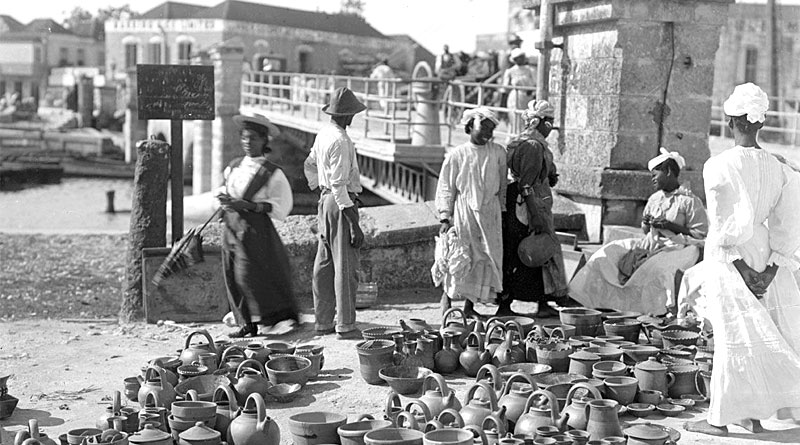Barbados Wasn’t Always A Gem For Me
Dorothy Cook-Worrell, age 81, tell us her story from her younger days. Barbados was tough back then and there wasn’t much. We didn’t have electricity, phone or water. You had to go to the stand pipe if you wanted water.
You could be waiting for almost a half hour before you could even get a bucket full. Everyone would be at that pipe, cows in all and you had to wait till they were finished drinking. In order to have water to start the day we would have to fetch it early mornings before school.
Chores Before Going to School
It was never easy then because children in all, had to work hard. They had to do chores before going to school. We had a lot of sheep and goats and would have to carry them out on mornings, which means most of the time you would get to school late.
Even when you got home on evenings there was no time to study. I attended the Welch Village Primary School which is no longer opened from 5 years to 9 years old. That was the longest you’d be in primary school (4 years). After that I went to St. John Mixed School, from 9 till 11 years old.
The age limit for secondary school then was 14, but I stopped at 11 because I had to stay home and help look after my siblings. Everyone had 1 book for school, and it had to last for the term.
Every year you would get new school clothes, no more than 2 uniforms and when they were washed out or in other words faded you would wear them as home clothes. We also wore straw hats to school and most children would have no shoes; they would go barefoot. I was lucky enough to have!
Push Carts with Bread

Travel then was mostly by foot, and barefoot to be exact. A person would walk from St. John to St. Phillip. We had a few buses and they were always on time. If you miss the bus you would have to wait till the next 3 hours or so for another one and if you miss the 12 o’ clock bus you would get home really late. There were push carts with bread that would come around twice a week, also donkey/mule carts.
If you died in the morning, you would be buried the evening same day. The men would make a box with old wood to put you in and you’d then be transported in a donkey cart. The donkey cart was the hearse then. If you lived not far away from the graveyard a few men would lift you in the box and take you over.
Don’t Visit Speightstown Without Reading This – CLICK HERE
For church we had 1-2 dresses. Nobody would look at you strange for wearing the same two dresses over and over again. I had a white dress for special occasions. The old men would wear a jacket, shirt, tie, pants and no shoes. Once again barefoot.
Every single Sunday was church and Sunday School a must! I was a Sunday School teacher, whilst I was a teenager. I would make sure parents had their children ready to go and take them back home afterwards. It was 3 to 4 of us teachers and who got the most children had the biggest class. We had babies in all at Sunday School. The church would also help provide for people in need with what they could afford.
The district was good together. If you troubled one of us you troubled all. You could leave your house opened and no one would go in. If you had clothes on the line and the rain was about to come down they would pick them up for you. If your children had no food they would give you.
It was a friendly atmosphere with lots of sharing and giving. Everyone raised the children within the district. You had to speak to everyone you passed unless it would be a flogging from both neighbor and parent.
The Historic Garrison Tunnels – CLICK HERE
You couldn’t answer back, stupse or complain. If you did you’d get a beating. There was 1 shop in the district and it sold everything including material to make clothes. We bought flour by the bag and these bags were whitish. The shopkeeper would also sell the bags and you would make clothes from them.
You would have no bedroom for yourself as you had to share with the family. Most homes then only had 1 bedroom, but ours had 2. We had a lot of seafood and ground food. Food was always fresh, ‘got it today cook it today’. We had no stove to cook on, instead we had to use dry wood.
You would have to sneak the wood from the plantation to bring home, but if you got caught by the watchman it was big trouble. Cane peeling even helped with the fire.
Children would drink out of condense milk tots and the adults would drink out of ovaltine tots, where handles were attached to both. We would eat in bowls made of calabash and babies would be fed out of drink bottles with a nipple on the top.
When you got sick bush was the remedy for everything. You wouldn’t hear much about diabetes, ulcers or cancer. Everyday we would drink shark oil and a dose of castor oil to wash you out.
We had no radio, so when hurricane season came around the white people would notify us. You would have to tie down your house with line, rope, chain and use sticks to keep it upright.
Schools well known today were boarding schools then. People would fly from England (mostly) and America to attend. Combermere, Lodge and Harrisons were male boarding schools, while Queen’s and St. Michaels were female boarding schools.
Poor persons had the toughest jobs and the rich would work in the highest places like banks and such. My father was a fisherman and my mother sold the fish for him when she could. Places like Cave Shepherd then, you could not find a black person working in or even walking in! That was a big store for only the white folks.
Those were the tough good old days. Everyone looked out for each other and there was a lot of LOVE. It was tough, BUT it was good. I LOVE MY COUNTRY.




